人教版八年级英语上册语法单词讲义
人教版英语八年级上册知识点、语法和作文总结

八年级上册英语知识点Unit1 Where did you go on vacation?一、短语stay at home 待在家里 go on vacation 去度假 go to the mountains 去爬山 go to the beach 去海滩 visit museums 参观博物馆 quite a few 相当多 go to summer camp 去参观夏令营study for 为……而学习 go out 出去 most of the time 大部分时间taste good 尝起来很好吃 of course 当然 have a good time 玩得高兴go shopping 去购物 feel like 给…的感觉;感受到 in the past 在过去walk aroundone bowl of… a bag of apples drink tea 喝茶 take photos 二、习惯用法 taste + adj. nothing…but+arrive in+大地点 / arrive at+小地点到达某地decide to do sth. 决定去做某事 try doing sth.尝试做某事 try to do sth.尽力去做某事forget doing sth.忘记做过某事/ forget to do sth.忘记做某事 enjoy doing sth.喜欢做某事want to do sth.想去做某事 start doing sth.开始做某事 stop doing sth. 停止做某事dislike doing sth. 不喜欢做某事 keep doing sth.继续做某事 Why not do sth.? 为什么不做……呢?so+adj.+that+从句如此……以至于…… tell sb. (not) to do sth. 告诉某人(不要)做某事三、词语辨析:1. anywhere 与 somewhere 两者都是不定副词。
人教版八年级上册英语Unit 3知识点梳理及语法讲义(教师版)

八年级上册英语Unit 3知识点与语法精讲精练词汇梳理(一)完成单词梳理:名词:1. competition比赛;竞赛 2. mirror 镜子 3. kid 小孩;年轻人4. grade 成绩等级5. hand 手6. saying 谚语;格言7. heart 内心;心脏8. fact 现实;事实9. information 信息;消息10. arm 手臂;上肢动词:1. win 获胜;赢 2. care 在意;关心 3. should 应该;应当4. reach 伸手;到达5. touch 感动;触摸6. break 损坏7. share 分享;共享;共用副词:1. loudly 喧闹地;大声地;响亮地 2. quietly 轻声地;轻柔地;安静地3. clearly 清楚地;清晰地;明白地4. truly 真正;确实形容词:1. outgoing 爱交际的;友好的;外向的 2. hard-working工作努力的;辛勤的3. fantastic 极好的;了不起的4. talented 有才能的;有才干的5. serious 严肃的;稳重的6. necessary 必需的;必要的7. loud 响亮的;大声的8. similar 相像的;类似的9. primary 最初的;最早的兼类词:1. both (adj/pron)两个;两个都2. better (adj/adv)较好的(地);更好的(地)3. which (pron/adj)哪一个;哪一些4. though (adv)不过;可是;然而(conj)虽然;尽管;不过5. laugh (v)笑;发笑(n)笑声(二) 词汇变形小结:1. good/well (adj/adv. 好的) — better (比较级) — best (最高级)2. loud (adj. 大声的) — loudly (adv.喧闹地)3. quiet (adj. 安静的) — quietly (adv. 安静地)4. competition (n. 竞争;比赛) — compete (v. 竞争;比赛)5. clearly (adv. 清楚地;清晰地) — clear (adj. 清楚的;清晰的)6. win (v. 赢;获胜) — won (过去式) — winner (n. 获胜者)7. talented (adj. 有才能的) — talent (n. 才能;天赋)8. truly(adv. 真正;确实) — true (adj. 真正的) — truth (n. 真实;真相)9. care(v. 在意;关心) — careful (adj. 认真的;细心的)10. serious(adj. 严肃的;稳重的) — seriously (adv. 严重地;严肃地)11. say(v. 说) — saying (n. 谚语;格言)12. touch(v. 感动;触摸) — touching (adj. 令人感动的) — touched (adj. 感动的)13. break(v. 破坏) — broke (过去式)【练一练】用所给词的适当形式填空1.Class Six won (win) the basketball game but our class lost the game.2.My friend likes telling jokes. He often makes us laugh (laugh)happily.3.Be quiet (quietly)! I have something important to tell you.4.I think Linda dances better (well) than Kate.5.Students can’t speak loudly (loud) in the library.6.Although he is only two years old, he can speak clearly (clear).7.The teacher told us to find out some information (information)about our country and share it next week.8.I’m truly (true) sorry that things had to end like this.st night we saw a movie and it made us touched (touch).10.I don't think differences (different) are important in a friendship.(三) 短语攻关:care about关心;在意be talented in 在……有天赋both...and...……和……都play the drums 敲鼓the singing competition 歌唱比赛be similar to 与……相像的bring out 使显现the same as 和……相同be different from与……不同as long as 只要in fact 事实上primary school 小学get good grades 取得好成绩have fun doing sth 做某事很开心make sb do sth 让某人做某事want to do sth 想要做某事make friends 交朋友be like 像……一样知识点梳理1.Both Sam and Tom can play the drums, but Sam plays them better than Tom. 萨姆和汤姆都会敲鼓,但是萨姆比汤姆敲得好。
人教版英语八年级上册单词-unit2词汇讲解

Unit 2 How often do you exercise?1. housework[u] 家务= chore [n] do housework = do choreshomework 作业schoolwork 学业2. hardlyhard adv. 努力地、猛烈地(程度副词); adj. 硬的、难的hard-working 努力的work hard 努力工作(work表示动词,hard表示副词)hard work努力工作(work表示名词,hard表示形容词词)hardly adv. 几乎不= seldom = hardly ever 辨析词:nearly 几乎、差不多3. everadv. 曾经; 现在完成时标志词adv. 在任何时候for ever = foreverever since 自那时起辨析词:even 甚至、更加4. once, twice adv. 一次;两次three… times 三次及以上(time表示“时间”,不可数;表示“次数”,可数名词)once 一次,一倍,曾经,一旦(主将从现)once upon a time 从前at once 立刻、马上5. Internet n. 互联网上网surf the Internet = go online在网上on the Internetnet 网network 网络inter-前缀,表示“互相、在……之间” international 国际的6. program n. 节目、程序、项目TV program 电视节目= TV showprogrammer 程序员exchange program 交换项目7. fulladj. 满的、饱的、忙的充满be full of= be filled with充分利用make full use of取得满分get full marksfully adv. 充分地、完全地ful-后缀,表示“充满……的” meaningful 有意义的colorful 多彩的less-后缀,表示“不、无” hopeless 没有希望的homeless 无家可归的8. swingn. 摆动、秋千v. 摇摆swing-swung-swungswing dance 摇摆舞9. maybe adv. 可能= perhaps任务型阅读的推测题中,回答要加maybe表示推断。
Unit7单词讲解人教版八年级英语上册

1.paper ['peɪpər]o n. 纸;纸张o固定搭配:a piece of paper 一张纸o例句:Can you pass me the paper, please? 请把纸递给我好吗?2.pollution[pə'luːʃn]o n. 污染;污染物o固定搭配:air pollution 空气污染;water pollution 水污染o例句:The factory is causing serious pollution to the river. 这家工厂正在对河流造成严重污染。
3.prediction[prɪ'dɪkʃn]o n. 预言;预测o固定搭配:make a prediction 做出预测o例句:No one can make accurate predictions about the future.没有人能对未来做出准确的预测。
4.future ['fjuːtʃər]o n. 将来;未来o固定搭配:in the future 在将来o例句:What do you think the future will bring? 你认为未来会带来什么?5.pollute [pə'luːt]o v. 污染o固定搭配:pollute the environment 污染环境o例句:The chemicals from the factory are polluting the river.工厂排放的化学物质正在污染河流。
6.environment[ɪn'vaɪrənmənt]o n. 环境o固定搭配:protect the environment 保护环境o例句:It's our responsibility to care for the environment. 保护环境是我们的责任。
7.planet['plænɪt]o n. 行星o固定搭配:the planets of the solar system 太阳系行星o例句:The Earth is the third planet from the Sun. 地球是距离太阳第三近的行星。
人教版八年级上册英语unit1语法讲解

Unit 1 核心语法知识点一、不定代词1.不定代词是不指明代替任何特定名词或形容词的代词。
常见的不定代词有some,any, no, every, each, both, all, little, few, a little, a few, other, another等。
2.some和any既可以修饰______________,也可以修饰______________。
但是some常用于_____句, any则多用于_____句、_____句和条件状语从句。
例如:→A: Is there _____ water in the bottle?B: Yes, there is _____ water. / No, there is not _____ water.3.但是在would you like some water?这类问句中用_____而不是用_____,因为问话者希望得到对方肯定的答复。
4.many, much, a lot of均表示“很多”。
但是many只修饰______________, much只修饰_______________, 而a lot of既可接____________,又可与__________连用。
5.few与a few是一对反义词,修饰____________;little和a little也是一对反义词,修饰___________。
few和little侧重于_____的概念,意思为_________,而a few和a little侧重于______的含义,意为__________。
→翻译Few students know what happened./ There is a little time to go.6.复合不定代词是由some-, any-, every-, no-, 加上-one, -body, -thing等所组成的不7.语动词用单数第三人称形式。
Unit2单词知识点讲义人教版英语八年级上册

2023年人教版初中英语八年级上册Unit 2单词知识点讲解(讲义)1 houseworkn.【u】家务事;家务劳动do the houseworkHousework is a never-ending task.She always helps with the housework.2 hardlyadv.几乎不,几乎没有There is hardly any tea in the bottle.We hardly know each other.用于can或者could后表示很难I can hardly keep my eyes open.我都快睁不开眼了。
同义词seldom几乎不3 everadv.从来;任何时候(否定句,疑问句和if引导的句子)Nothing ever happens here.这儿几乎没发生过任何事。
adv.总是;曾经It was raining harder than ever.当下下着前所未有的大雨。
4 hardly ever表示频率非常低,几乎不会发生I hardly ever go to concerts.I hardly ever eat fish.She hardly ever exercises.5 onceadv.一次;仅一次I’ve only been there once.我只去过那里一次。
She cleans his car once a week.她一个周洗一次车。
adv.曾经I once met your mother.The book was once famous, but nobody reads it today.conj. 一旦The water is fine once you’re in.你一旦下了水,就觉得水里很舒服。
at once 立刻;马上once again再一次once more 又一次;再一次once upon a time 从前;很久以前6 twiceadv.两次They go there twice a month.adv.两倍Cats sleeps twice as much as people.猫睡觉的时间比人长一倍。
新人教版八年级上册英语单元语法及知识点归纳

新人教版八年级上册英语单元语法及知识点归纳-CAL-FENGHAI.-(YICAI)-Company One1新人教版八年级上册英语单元语法及知识点归纳Unit1 Where did you go on vacation?【重点语法】不定代词:不指名代替任何特定名词或形容词的代词叫做不定代词。
用法注意:1. some 和any +可数名/不可数名。
some 多用于肯定句,any多用于否定句、疑问句和条件从句。
有些问句中用some,不用any, 问话者希望得到对方肯定回答。
2. 由some, any, no, every 与 body, one, thing构成的复合不定代词作主语时,其谓语动词用三单。
3. 不定代词若有定语修饰,该定语要置于其后:如:something interesting【重点短语】1. buy sth for ab./ buy sb. sth 为某人买某物2. taste + adj. 尝起来……3. nothing...but + V.(原形) 除了……之外什么都没有4. seem + (to be) + adj 看起来5. arrive in + 大地方 / arrive at + 小地方到达某地6. decide to do sth. 决定做某事7. try doing sth. 尝试做某事 / try to do sth. 尽力做某事8. enjoy doing sth. 喜欢做某事9. want to do sth. 想去做某事10. start doing sth. 开始做某事=begin doing sth.11. stop doing sth. 停止做某事区分: stop to do sth. 停下来去做某事12. dislike doing sth. 不喜欢做某事14. so + adj + that + 从句如此……以至于……16. tell sb. (not) to do sth. 告诉某人(不要)做某事17. keep doing sth. 继续做某事18. forget to do sth. 忘记去做某事 / forget doing sth 忘记做过某事【词语辨析】1. take a photo/ take photos 拍照quite a few+名词复数“许多…”2. seem + 形容词看起来…... You seem happy today.seem + to do sth. 似乎/好像做某事 I seem to have a coldIt seems + 从句似乎..…. It seems that no one believe you.seem like ... 好像,似乎….. It seems like a good idea.3. arrive in +大地点= get to= reach+地点名“到达......”arrive at +小地点(注:若后跟地点副词here/there/home, 介词需省略,如: arrive here; get home)4. feel like sth 感觉像…feel doing sth. 想要做某事5. wonder(想知道)+疑问词(who, what, why)引导的从句。
人教版八年级上册英语单词讲解
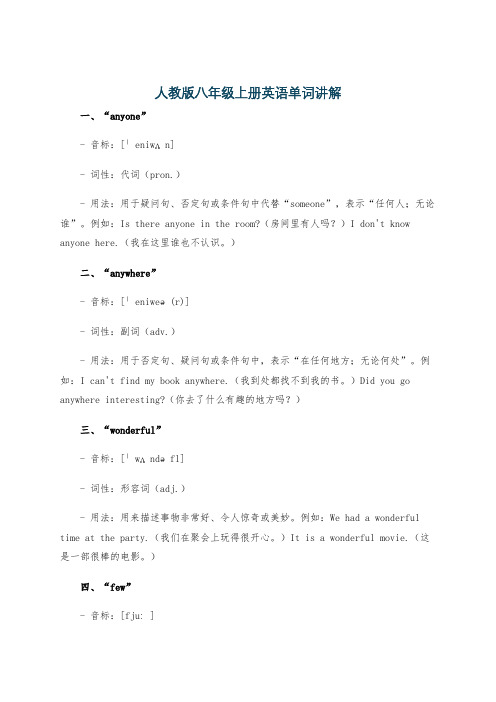
人教版八年级上册英语单词讲解一、“anyone”- 音标:[ˈeniwʌn]- 词性:代词(pron.)- 用法:用于疑问句、否定句或条件句中代替“someone”,表示“任何人;无论谁”。
例如:Is there anyone in the room?(房间里有人吗?)I don't know anyone here.(我在这里谁也不认识。
)二、“anywhere”- 音标:[ˈeniweə(r)]- 词性:副词(adv.)- 用法:用于否定句、疑问句或条件句中,表示“在任何地方;无论何处”。
例如:I can't find my book anywhere.(我到处都找不到我的书。
)Did you go anywhere interesting?(你去了什么有趣的地方吗?)三、“wonderful”- 音标:[ˈwʌndəfl]- 词性:形容词(adj.)- 用法:用来描述事物非常好、令人惊奇或美妙。
例如:We had a wonderful time at the party.(我们在聚会上玩得很开心。
)It is a wonderful movie.(这是一部很棒的电影。
)四、“few”- 音标:[fjuː]- 词性:形容词(adj.)、代词(pron.)- 用法:作为形容词时,表示“很少的;几乎没有的”,修饰可数名词复数。
例如:There are few students in the classroom.(教室里几乎没有学生。
)作为代词时,可单独使用,也表示“很少;几个”。
例如:Many people tried, but few succeeded.(许多人尝试了,但很少有人成功。
)五、“most”- 音标:[məʊst]- 词性:形容词(adj.)、副词(adv.)、代词(pron.)- 用法:作为形容词时,意为“最多的;大多数的”,可修饰可数或不可数名词。
例如:Most students like English.(大多数学生喜欢英语。
Unit1知识点梳理及语法讲义-2024-2025学年人教版英语八年级上册

八年级上册英语Unit 1知识点与语法精讲精练词汇梳理(一)完成单词梳理:名词:1. hen母鸡 2. pig 猪 3. diary 日记;记事簿4. activity 活动5. paragliding 滑翔伞运动6. bird 鸟7. bicycle 自行车8. building 建筑物;房子9. trader 商人10. difference 差别;差异11. top 顶部;表面12. umbrella 伞;雨伞13. hill 小山;山丘14. duck 鸭动词:1. seem 好像;似乎;看来 2. decide 决定;选定 3. wonder 想知道;琢磨4. wait 等待;等候代词:1. anyone 任何人 2. something 某事;某物 3. nothing 没有什么4. everyone 每人;人人;所有人5. myself 我自己;我本人6. yourself 你自己;您自己7. someone 某人副词:1. anywhere 在任何地方形容词:1. wonderful 精彩的;绝妙的 2. bored 厌倦的;烦闷的3. enjoyable 有乐趣的;令人愉快的4. wet 湿的;潮湿的5. hungry 饥饿的兼类词:1. few (adj/pron)不多;很少 2. most (adj/adv/pron)最多;大多数3. try (n/v)尝试;设法;努力4. below (prep/adv)在……下面5. enough (adj/adv)足够的(地)6. dislike (v/n)不喜爱(的事物)7. as (adv)像……一样(conj)当……时;如同(二) 词汇变形小结:1. wonder (v. 想知道) — wonderful (adj. 精彩的;绝妙的) — wonderfully (adv. 精彩地)2. bore (v. 使……厌烦) — bored (adj.厌倦的)— boring (adj.令人厌倦的)3. diary (n. 日记) — diaries (复数)4. enjoy (v. 喜爱) — enjoyable (adj. 有乐趣的;令人愉快的)5. activity (n. 活动) — activities (复数)6. decide (v. 决定) — decision (n. 决定)7. build (v. 建造) — building (n. 建筑物;房子)8.trade (n/v贸易;买卖) — trader (n. 商人)9. difference (n. 差别;差异) — different (adj. 不同的)10. wait(v. 等候;等待) — waiter (n. 男服务员) — waitress (n. 女服务员)11. like(v. 喜欢)— dislike 反义词(v.不喜欢)【练一练】用所给词的适当形式填空1.–Mom. I plan to wash clothes by ___myself____(I) this summer vacation.- Good girl! Go for it.2.Can you tell me some __differences___(different) between the two pictures?3.The students have quite a few activities (activity) after class. They can sing, dance and play basketball.4.I think it will be a very enjoyable (enjoy) trip for you to travel to Beijing.5.His cousin is a trader (trade), selling fruit and vegetables.6.The TV show is really boring (bore). I don’t want to watch it.7.As a teacher, Mr. Green always tries to make his lessons _enjoyable__(enjoy).8.This film is _wonderful___ (wonder). I like to see it very much.9.I can look after __myself____(my). Don’t worry about me.10.You must look after __yourself____(you) well while I'm away, Tom.(三) 短语攻关:go on vacation去度假stay at home 待在家里go out 出去quite a few 相当多;不少most of the time大部分时间of course当然have a good time=enjoy oneself 玩得高兴feel like 给……的感觉;感觉像take photos 拍照;照相keep a diary 写日记buy sth for sb 买某物给某人decide to do sth 决定做某事something important 重要的事find out 找出;查明in the past 在过去make a difference 产生影响;起作用enjoy doing sth喜欢做某事too many 太多arrive at/in 到达because of 因为;由于wait for 等待;等候start to do /doing sth开始做某事知识点梳理1.We took a few photos there.我们在那里拍了很多照片。
人教版八年级上册英语单词讲解
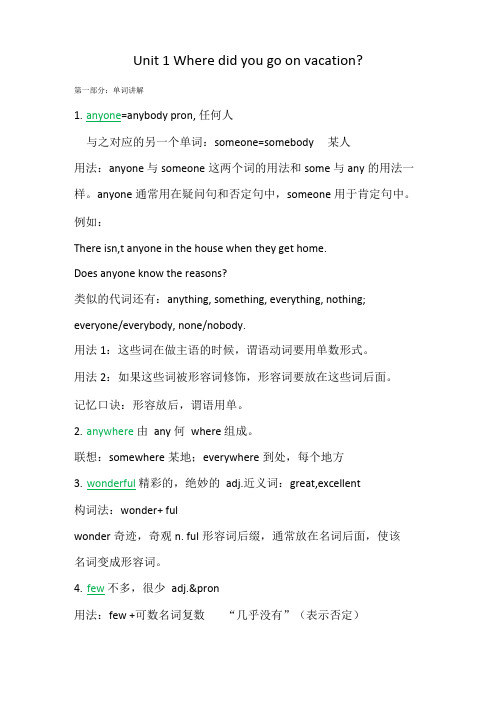
Unit 1 Where did you go on vacation?第一部分:单词讲解1.anyone=anybody pron, 任何人与之对应的另一个单词:someone=somebody 某人用法:anyone 与someone这两个词的用法和some 与any的用法一样。
anyone通常用在疑问句和否定句中,someone用于肯定句中。
例如:There isn,t anyone in the house when they get home.Does anyone know the reasons?类似的代词还有:anything, something, everything, nothing; everyone/everybody, none/nobody.用法1:这些词在做主语的时候,谓语动词要用单数形式。
用法2:如果这些词被形容词修饰,形容词要放在这些词后面。
记忆口诀:形容放后,谓语用单。
2.anywhere 由any 何where 组成。
联想:somewhere某地;everywhere到处,每个地方3.wonderful 精彩的,绝妙的adj.近义词:great,excellent构词法:wonder+ fulwonder奇迹,奇观n. ful形容词后缀,通常放在名词后面,使该名词变成形容词。
4.few 不多,很少adj.&pron用法:few +可数名词复数“几乎没有”(表示否定)a few+可数名词复数“有一些”(表示肯定)拓展:little & a littlelittle+不可数名词“几乎没有”(表示否定)A little+不可数名词“有一些”(表示肯定)记忆口诀:带a表肯定,无a表否定,few是可数的,little不可数例句:(1)She is very shy,and she has few friends.(2)There is little milk left,let’s go and buy some.5.most大多数的adj.用法:most of the+名词=most+名词例如:most of the students=most students6.myself 我自己yourself 你自己以self结尾的单词,称为“反身代词”。
人教版八年级上册英语Unit 4知识点梳理及语法讲义(教师版)
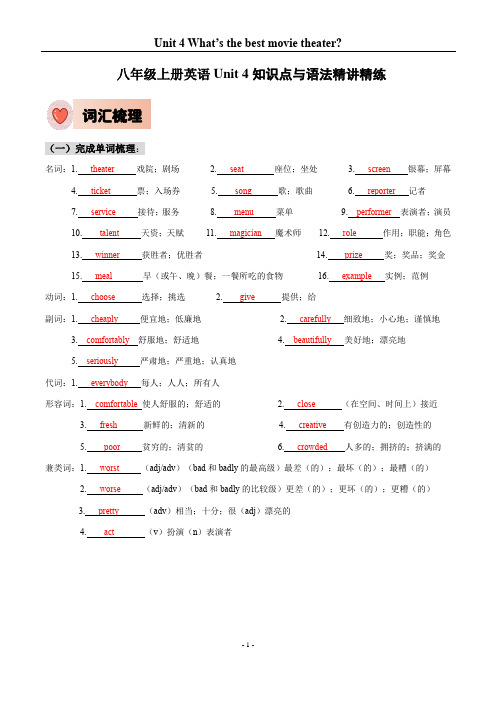
八年级上册英语Unit 4知识点与语法精讲精练词汇梳理(一)完成单词梳理:名词:1. theater 戏院;剧场 2. seat 座位;坐处 3. screen 银幕;屏幕4. ticket 票;入场券5. song 歌;歌曲6. reporter 记者7. service 接待;服务8. menu 菜单9. performer 表演者;演员10. talent 天资;天赋11. magician 魔术师12. role 作用;职能;角色13. winner 获胜者;优胜者14. prize 奖;奖品;奖金15. meal 早(或午、晚)餐;一餐所吃的食物16. example 实例;范例动词:1. choose 选择;挑选 2. give 提供;给副词:1. cheaply 便宜地;低廉地 2. carefully 细致地;小心地;谨慎地3. comfortably 舒服地;舒适地4. beautifully 美好地;漂亮地5. seriously 严肃地;严重地;认真地代词:1. everybody 每人;人人;所有人形容词:1. comfortable 使人舒服的;舒适的 2. close (在空间、时间上)接近3. fresh 新鲜的;清新的4. creative 有创造力的;创造性的5. poor 贫穷的;清贫的6. crowded 人多的;拥挤的;挤满的兼类词:1. worst (adj/adv)(bad和badly的最高级)最差(的);最坏(的);最糟(的)2. worse (adj/adv)(bad和badly的比较级)更差(的);更坏(的);更糟(的)3. pretty (adv)相当;十分;很(adj)漂亮的4. act (v)扮演(n)表演者(二) 词汇变形小结:1. comfortable (adj. 使人舒服的) — comfortably (adv. 舒适地) — uncomfortable (反义词:不舒服的) — uncomfortably (反义词:不舒服地)2. bad/badly (adj/adv. 糟糕的;糟糕地) — worse (比较级) — worst (最高级)3. cheaply (adv. 便宜地) — cheap (adj. 便宜的)4. choose (v. 选择) — chose (过去式) — choice (n. 选择)5. carefully (adv. 小心地) — careful (adj. 小心的) — careless (反义词:粗心地) — carelessly (反义词:粗心的)6. report (v. 报告) — reporter (n. 记者)7. act (v. 扮演) — actor (n. 演员) — action (n. 动作;行动)8. creative(adj. 有创造力的) — create (v. 创造)9. talent(n. 天资;天赋) — talented (adj. 有才能的)10. magician(n. 魔术师) — magic (adj/n. 有魔力的;魔术)11. beautifully(adv. 漂亮地) — beautiful (adj. 漂亮的)12. winner(n. 获胜者) — win (v. 赢;赢得)13. service(n. 接待;服务) — serve (v. 服务;接待)14. performer(n. 表演者;演员) — perform (v. 表演)15. seriously(adv. 严重地) — serious (adj. 严肃的)16. give(v. 提供;给) — gave (过去式)【练一练】用所给词的适当形式填空1.Let’s go to Danny’s. The food there is cheapest(cheap)in town.2.I like the movie theater Movie Palace best because I can sit comfortably(comfortable).3.The radio station Oldies 102.1FM is pretty bad. It’s___worse___(bad)than All Talk 970AM.4.His brother is a __reporter__ (report).5.It’s time for class. The students should take their ___seats___ (seat).6.Her friend wants to be a performer (perform) when she grows up.7.I think Liu Qian is the most exciting magician (magic).8.You must take this English test seriously (serious).9.The winner (win) is an 8-year-old girl in the dancing competition.10.Who can sing songs the most beautifully (beautiful) in your family?(三) 短语攻关:close to 离……近so far到目前为止no problem 没问题talent show 才艺表演around the world 世界各地look for 寻找all kinds of 各种各样的have...in common 有相同特征be up to 是……的职责;由……决定play a role 发挥作用;有影响make up 编造(故事、谎言等)for example 例如take...seriously 认真对待……come true 实现thanks for... 因……而感谢thanks to 幸亏;多亏1.Thanks for telling me. 谢谢你告诉我。
人教版八年级英语上册1-5单元知识点(词汇+句型+固定搭配)语法

Unit 1 How often do you exercise?词汇:1. how often: 多久一次7. health: 健康,12. on weekends: 在周末how many: 多少+可数名词healthy:健康的13. once a week:一周一次2. always(100%)- 总是unhealthy: 不健康,twice a week:一周两次usually(80%) –通常keep/stay healthy three times a month: 一月三次often(60%)- 经常= keep/stay in good health: 保持健康14. most: 大部分的,绝大多数的sometimes(40%)- 有时候8. get good grades: 取得好成绩all: 所有的hardly ever(20%)- 几乎不9. the same as: 与…不同15. be good for: 对…有益never(0%) 从不10. a lot of = lots of: 大量,许多+ 可数/不可数名词be bad for: 对…有坏处3. surf the internet: 上网 a lot = very much: 十分,非常,很16. how many: 多少, +可数名词4. as for: 至于,关于11. maybe: 也许,大概how much: 多少,+不可数名词5. junk food: 垃圾食品may be: 也许是,或许是(may是情态动词,be是动词原形)how much 多少钱,(问价格)6. look after = take care of:照顾12. little: 小的,a little boy: 一个小男孩17. of course = sure 当然look for: 寻找little: 少,little少→less更少→least最少(修饰不可数名词)look up: 查找(单词、信息)little: 几乎没有,否定词(修饰不可数名词)look at: 看 a little: 少许,有一点,肯定词(修饰不可数名词)few: 几乎没有,否定词(修饰可数名词)a few少许,有一点,肯定词(修饰可数名词)句型:1.How often do you exercise? →I exercise three times a week. How often does she shop? →She shops once a month.2.What do you usually do on weekends? →I usually watch TV. How often does she watch TV? →She watches TV everyday.3.How many hours do you sleep every night? 你每晚睡几个小时?→I sleep nine hours every night.How many books do you have? 你有多少本书?→I have 5 books.How much is the sweater? 这件毛衣多少钱?How much water do you have? 你有多少水?(how much: 多少,后面+不可数名词, water是不可数名词)4.What’s your favorite program? 你最喜欢的电视节目是什么?→It’s Animal World.固定搭配:try to do sth.: 尽力做某事,设法做某事try doing sth.: 试着做、尝试做某事help sb. (to) do sth: 帮助某人做某事(to可以省略)want sb. to do sth.: 想要某人做某事Unit 2 What’s the matter?词汇:1. have a cold 感冒9. few: 几乎没有,否定词(修饰可数名词)have a fever 发烧 a few少许,有一点,肯定词(修饰不可数名词)have a stomachache 肚子痛little: 几乎没有,否定词(修饰不可数名词)have a headache 头疼 a little: 少许,有一点,肯定词(修饰不可数名词)have a toothache 牙齿疼10. at the moment = now 现在,此刻have a sore throat 喉咙疼11. host family 寄宿家庭have a sore back 背部酸疼12. not…until…直到……时候才……2. lie down and have a good rest 躺下好好休息13. should 应该,情态动词,后+动词原形3. hot tea with honey 加了蜂蜜的热茶should not=shouldn’t4. ill 病了的illness 疾病14. see a doctor 看医生5. advice 建议(不可数名词)see a dentist 看牙医some advice(不能加”s”) 15. too many太多…,修饰可数名词too many students 6. be stressed out 有压力的,紧张的too much太多…,修饰不可数名词too much yin7. balance 平衡balanced 平衡的much too 太……,much too big 太大a balanced diet 平衡的饮食16. stay=keep 保持on a diet 节食keep/stay healthy8. get 变得= keep/stay in good health: 保持健康get angry 变得生气get tired 变得劳累句型:1. What’s the matter with you? = What’s the trouble with you? = What’s wrong with you? 你怎么了?→I have a cold/ have a toothache/ have a sore throat….2. Wha t’s the matter? →She has a cold.3. Does he have a cold? →Yes, he does.4. A: What’s the matter?B: I’m not feeling well.(此处不能用good) I have a cold.A: When did it start?B: About two days ago.A: That’s too bad. You should drink lots of water.B: Yes, I think so.A: I hope you feel / get better soon. 我希望你尽快好起来5. A: I have a coldB: I am sorry to hear that. (当听到对方不好的消息时使用此句)固定搭配:It is + 形容词+ (for sb.) to do sth. 做某事对某人来说是………的例句:It is easy for me to learn (learn) English. 对我来说学英语是容易的It is interesting to watch (watch) Animal World. 看动物世界时有趣的Unit 3 What are you doing for vacation?→→→本单元用现在进行时态表示将来的事情现在进行时态,即be + doing:词汇:1. go camping 去野营 6. a lot = very much 十分、非常、很2. A: What are you doing for vacation?go fishing 去钓鱼 a lot of = lots of 许多、大量B: I am going camping.go shopping 去购物7. away 向远处、离开A: That sounds nice.go swimming 去游泳go away 离开Who are you going with?go hiking 去远足B: I am going with my parents.go bike riding 去骑单车8. stay: 留、停留、呆go sightseeing 去观光旅游 3. Linda is going to Tibet next summer. (划线提问)2. how long 多久、多长时间句型:→Where is Linda going next summer?3. get back 回来get back to school 1. What are you doing for vacation?4. He’s going on the 12th. (划线提问)4. be famous for…以……而闻名→I am visiting my grandparents. →When is he going?5. leave for…离开去……地方What is your brother doing for vacation?leave →(过去式) left →He is going camping. 5. I’m staying there for a week. (划线提问)left: 左边、离开→How long are you staying?6.当听到对方提出的建议,如:What about playing basketball? How about taking a walk with me? Why not go to the movie? 为什么不去看电影?I am going camping.等句子时,回答可用以下句型:That sounds nice/ good/ interesting/. That’s a good idea. / Good idea. That sounds like a good idea./ Great等.7.当听到对方要去旅行或是准备出行时,如:I am going to Hongkong for a week. I am going hiking in the mountains.时,回答一般用以下句型:Havea good time!8.询问天气:How is the weather? 或是What’s the weather like?9.询问某人的职业:What do you do? What are you? What’s your job? 你的工作是什么?What does your mother do? What is he? 他是干什么的?10.询问某人的性格:What are you like? →I am outgoing/ shy/ quiet.What is he like? 他是个什么样的人?→He is outgoing/ shy/ quiet. 他很外向/害羞/安静10. 询问某人长的什么样子:What does he look like? 他长的什么样子?→He is of medium build/height. 他中等身材/身高.What does your father look like? →He is tall. 他很高11. 询问某人喜欢什么:What do you like? 你喜欢什么?→I like basketball. 我喜欢篮球固定搭配:1.finish doing sth 完成做某件事例:I finished doing my homework. 我完成了我的家庭作业Unit 1-3 单元课本语法知识& 在讲解畅优新课堂时补充的语法知识点与固定搭配:1.情态动词后+动词原形(do)已学情态动词:can 能够, must 必须, should 应该, may 也许. would 想,会help sb (to) do sth 帮助某人做某事2. 介词后若接动词,则接动词的ing形式:常见的:what about + doing sth? 做………怎么样?常接doing的固定搭配:1. like doing sth 喜欢做某事2. enjoy doing sth 享受做某事3. have a good/ have fun in doing sth 做某事玩的很开心4. finish doing sth 完成做某件事5. spend +(时间、金钱、精力) doing sth 花时间、金钱、精力做某事= spend +(时间、金钱、精力) on sth3. 不定式,即:to do常接不定式的固定搭配:want sb to do sth 想要某人做某事would like to do sth 想做某事tell sb to do sth 告诉某人做某事ask sb to do sth 要求某人做某事plan to do sth 计划做某事decide to do sth 决定做某事need to do sth 需要做某事forget to do sth 忘记做某事try to do sth 尽力做某事4. 不定代词+ 形容词结构例:something interesting 一些有趣的事情Unit 4 How do you get to school?词汇:1. get to: 到达arrive at: 到达+ 小地点(学校、医院…)arrive in: 到达+ 大地点(城市、国家、地区…)reach: 到达2. take the bus = by bus:坐公交车8. how long: 多久,how far:多远13. take…to…把…带到…3. take the train = by train:坐火车9. from…to…从…到…14. from: 离…的距离4. take the subway = by subway:坐地铁10. think of: 认为think about: 考虑15. not all: 不是所有5. ride one’s bike = by bike:骑单车11. around the world = all over the world: 全世界6. walk = on foot:走路12. be different from: 与…不同16. more…than…:比…更…,than: 比7. depend on: 视……而定,决定于……,依靠……17.other 其他的,形容词18. than 比others 其他的人或其他的事19. more…than…比……更……,形容词比较级的用法the other 两者中的另一个,单数概念the others 两部分中的另一部分,复数概念another 另外一个,另外的,第三个的句型:1. How do you get to school? →I take the bus. / I go to school by bus.How does she get to school? →She takes the bus. / She goes to school by bus.2. How long does it take?→It takes about/around 10 minutes. →It takes about 25 minutes to walk and 10 minutes by bus. How long does it take you to get from home to school? →It takes 25 minutes.3. How far is it from your home to school? →It’s 3 miles./10 kilometers.4. What do you think of………? = how do you like……? 你认为……怎么样?5. How far do you live from school?你住的离学校有多远→I live 10 miles from school.6. Can I help you? May I help you? →Yes, please.固定搭配:1.It takes sb. + 时间+ to do sth. 例句:It takes me 20 minutes to walk (walk)2.need to do sth. 需要做某事3.more…than…比……更……,形容词比较级的用法4 形容词的比较级&最高级:规则变化:比较级:形容词尾+“er”,最高级:+“est ”,例:big →bigger →the biggest不规则变化:三个音节及以上的形容词(比较长的形容词),比较级:前面+ more, 最高级:前面+most,例:popular 流行的→more popular更流行的→the most popular 最流行的最高级前面+“the”例:This classroom is bigger than that one. 这件教室比那间大This classroom is the biggest. 这间教室是最大的Unit 5 Can you come to my party?词汇:1. other 其他的The other 另一个(两个中的另一个) 9. have to 不得不,要…The others 另一部分(两部分中的另一部分)10. babysit= look after = take care of = care for 关心,照顾Another 另外的,另一个(三个以上中的另一个)2. the day before yesterday 前天句型:yesterday 昨天 1. Can you come to my party?today 今天Yes, I’d love to.(肯定回答)tomorrow 明天I’m sorry, I can’t. I have to……(否定回答)the day after tomorrow 后天 2. What’s today? 今天星期几,几号?(星期、日期都可以问) 3. on weekends 在周末It’s Monday the 14th. 今天14号星期一。
新人教版八年级上册英语单元语法及知识点概述
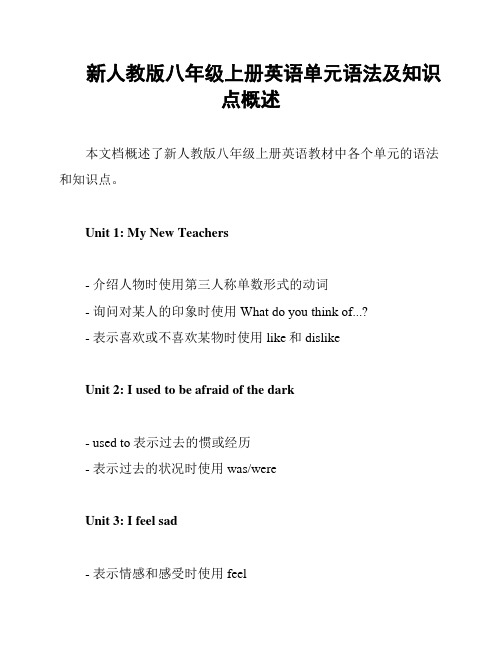
新人教版八年级上册英语单元语法及知识点概述本文档概述了新人教版八年级上册英语教材中各个单元的语法和知识点。
Unit 1: My New Teachers- 介绍人物时使用第三人称单数形式的动词- 询问对某人的印象时使用What do you think of...?- 表示喜欢或不喜欢某物时使用like和dislikeUnit 2: I used to be afraid of the dark- used to表示过去的惯或经历- 表示过去的状况时使用was/wereUnit 3: I feel sad- 表示情感和感受时使用feel- 使用be动词+形容词表达情感状态- 表示总是或经常做某事时使用always或often Unit 4: What's the best movie theater?- 比较级和最高级的用法- 询问建议时使用What do you suggest?- 表示原因时使用becauseUnit 5: It must belong to Carla- 表示推测或某事是肯定的时使用must- 表示推测或某事是可能的时使用might- 表示推测或某事是否定的时使用can'tUnit 6: I like music that I can dance to- 表示喜欢某种中性事物时使用like- 表示喜欢可以+动词原形的事物- 表示不喜欢不可以+动词原形的事物Unit 7: Teenagers should be allowed to choose their own clothes- 表示应该或不应该做某事时使用should or shouldn't- 表示能够或不允许做某事时使用can or can't- 使用be动词+动词不定式表示被允许或不被允许做某事Unit 8: Home alone- 表示需要或必需做某事时使用have to- 表示过去需要或必需做某事时使用had to- 表示建议或推荐时使用should或had betterUnit 9: When was it invented?- 使用一般过去时表示过去的经历或事件- 使用一般过去时的疑问句形式提问过去的经历或事件- 使用介词短语表示一段时间以上是新人教版八年级上册英语教材中各单元的语法和知识点概述。
人教版八年级上册英语Unit 8 知识点语法归纳总结

人教版八年级上册英语Unit 8 知识点语法归纳总结一、过去进行时(Past Continuous Tense)过去进行时用于表示过去某一时刻或某段时间正在进行的动作或状态。
1. 构成肯定句:主语 + was/were + 动词的ing形式否定句:主语 + was/were not + 动词的ing形式一般疑问句:Was/Were + 主语 + 动词的ing形式?肯定回答:Yes, 主语 + was/were.否定回答:No, 主语 + wasn't/weren't.2. 使用场景过去进行时常用于以下场景:- 表示过去某一时刻正在进行的动作- She was cooking dinner when I arrived. (我到达的时候,她正在做晚饭。
)- 表示过去某一段时间内持续进行的动作- They were playing basketball all afternoon. (他们整个下午都在打篮球。
)- 表示过去两个同时进行的动作- While he was studying, I was watching TV. (他在研究的时候,我正在看电视。
)二、过去完成时(Past Perfect Tense)过去完成时用于表示在过去某一时间或动作之前已经发生的动作或状态。
1. 构成肯定句:主语 + had + 过去分词否定句:主语 + hadn't + 过去分词一般疑问句:Had + 主语 + 过去分词?肯定回答:Yes, 主语 + had.否定回答:No, 主语 + hadn't.2. 使用场景过去完成时常用于以下场景:- 表示在过去某一时间或动作之前已经发生的动作- They had already left when I arrived. (当我到达时,他们已经离开了。
)- 表示过去某一时间之前已经完成的动作- She had finished her homework before dinner. (她在晚饭之前已经完成了作业。
人教版八年级上册英语Unit5知识点梳理及语法讲义(教师版)
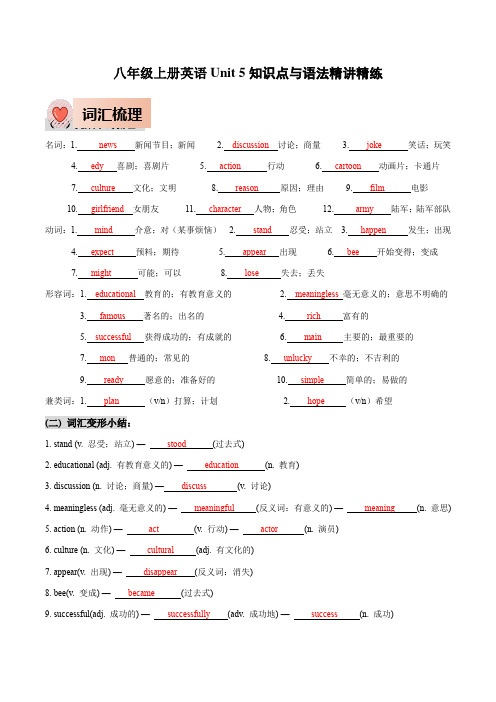
2.I don’t mind them.我不介意它们。
【用法详解】mind意为“介意;对(某事)烦恼”,其后跟动词时,要用它的动名词形式。mind doing sth意为“介意做某事”。
7.A busdisappeared(appear)in the corner when I was planning to take a taxi.
8.Guo Jingjing worked hard andbecame(bee)an excellent athlete(运动员).
9.He was sounluckythat he fell off the bike yesterday.Luckily,he wasn't hurt badly.(lucky)
八年级上册英语Unit5知识点与语法精讲精练
(一)完成单词梳理:
名词:1.news新闻节目;新闻2.discussion讨论;商量3.joke笑话;玩笑
4.edy喜剧;喜剧片5.action行动6.cartoon动画片;卡通片
7.culture文化;文明8.reason原因;理由9.film电影
10.girlfriend女朋友11.character人物;角色12.army陆军;陆军部队
be famous for
因……而出名
后接出名的原因
be famous to
为……所熟知
后常接人
【语境串记】Edisonis famous asan inventor in the world, and heis famous forhis inventions. Heis famous tothe people all over the world.爱迪生是世界著名的发明家,他因他的发明而闻名。他为全世界的人所熟知。
人教版八年级上册英语Unit 2 知识点语法归纳总结
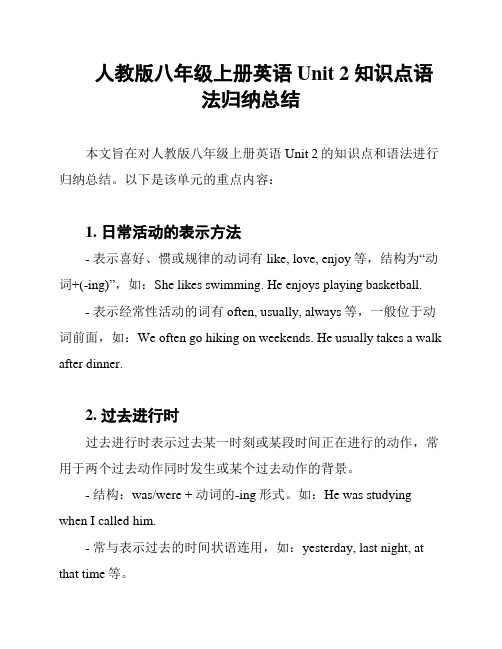
人教版八年级上册英语Unit 2 知识点语法归纳总结本文旨在对人教版八年级上册英语Unit 2的知识点和语法进行归纳总结。
以下是该单元的重点内容:1. 日常活动的表示方法- 表示喜好、惯或规律的动词有like, love, enjoy等,结构为“动词+(-ing)”,如:She likes swimming. He enjoys playing basketball.- 表示经常性活动的词有often, usually, always等,一般位于动词前面,如:We often go hiking on weekends. He usually takes a walk after dinner.2. 过去进行时过去进行时表示过去某一时刻或某段时间正在进行的动作,常用于两个过去动作同时发生或某个过去动作的背景。
- 结构:was/were + 动词的-ing形式。
如:He was studying when I called him.- 常与表示过去的时间状语连用,如:yesterday, last night, at that time等。
3. 被动语态的构成和用法- 构成:be + 过去分词。
如:The book was written by a famous author.- 主动句变被动句的转换方法:将主动句的宾语变为被动句的主语,原主语变为介词"by"的宾语。
如:She eats an apple.(主动句)→ An apple is eaten by her.(被动句)- 被动语态用于强调动作的承受者,或者当我们不知道或不关心动作的执行者是谁时。
4. 双宾语结构有些动词后面既可以跟一个间接宾语,也可以跟一个直接宾语,这种结构称为双宾语结构。
- 结构:动词 + 间接宾语 + 直接宾语。
如:She bought her sister a present.- 常见的双宾语动词有give, send, lend, teach等。
- 1、下载文档前请自行甄别文档内容的完整性,平台不提供额外的编辑、内容补充、找答案等附加服务。
- 2、"仅部分预览"的文档,不可在线预览部分如存在完整性等问题,可反馈申请退款(可完整预览的文档不适用该条件!)。
- 3、如文档侵犯您的权益,请联系客服反馈,我们会尽快为您处理(人工客服工作时间:9:00-18:30)。
Unit1 Where did you go on vacation 一.语法:(一般过去时)1.定义:表示过去发生的动作或存在的状态。
was / were +…… 2.结构: 主语+ am, is areV 过+…… 3.V.过的变化规则: ①直接加ed②以e 结尾直接加d③以“辅+y”结尾,变y 为i 再加ed④ 以“辅元辅”结尾,双写最后一个辅音字母,再加ed ⑤ 不规则(重点)4.标志词:①yesterday (yesterday morning , the day before yesterday…..) ②……ago (six hours ago, one year ago, two months ago……) ③last+时间(last year, last month ,last week ,last weekend……) ④in the past 在过去 句尾 ⑤in those days 在那些天⑥just now 刚才⑦at that time 在那时 ⑧this morning 今天早上 ⑨over the weekend 整个周末⑩今天以前的任何时间(in 2018 , in the 1960s ……)二.词汇:anyone ['eniw ʌn] pron. 任何人 something ['s ʌm θɪŋ] pron. 某事物;nothing ['n ʌθɪŋ] pron. 没有什么n. 没有 everyone ['evriw ʌn] pron. 每人;人人 someone ['s ʌm w ʌn] pron. 某人;有人1. 不定代词:指人:everyone someone anyone no one everybody somebody anybody nobody指物:everything something anything nothing用法: ①作主语,V 单② 不定代词+adj. someone 变anyone③ 在否定句和疑问句中: somebody 变anybodysomething 变anythinganywhere ['eniwe ə(r)] adv.任何地方n.任何(一个)地方dislike doing sth.(不喜欢干某事)have a good time=enjoy oneself=have fun玩得痛快Central Park 中央公园Tian'anmen square 天安门广场the Palace Museum 故宫博物院Unit2 How often do you exercise?一.语法:(频度副词和次数的表达)(一).频度副词always > usually > often>sometimes > seldom > hardly ever > nevershare [ʃe ə(r)] vt.分享,共享;分配;共有14. share sth. with sb. 和某人分享某物share in sth. 共同分担某事similar ['s ɪm əl ə(r)] adj. 类似的 be similar to 类似于;与...相似primary ['pra ɪm əri] adj.最初的,最早的information [ˌɪnf ə'me ɪʃn] n.信息;情报;资料;通知16. information 不可名Unit4 What's the best movie theater? 一. 语法:(adj.&adv.最高级)1.定义:表示三者或以上同类事物之间的比较 ①主+谓+the+最高级+范围②主+谓+比+than+any other+名单+范围 2.结构 ③One of +the +形高名复 is……④ the +序数词+形高名单 is ……⑤主+谓+the +最高级+名词+I have ever ……theater ['θɪətə] n.剧场;电影院;戏院comfortable ['kʌmftəbl] adj.舒适的;充裕的comfortably ['kʌmftəbli] a d v.舒服地;容易地;充裕地seat [siːt] n.座位;1.have a seat =sit down 坐下sit v.坐(sat)screen [skriːn] n.屏幕;银幕close [kləs]v.关;合拢;不开放;停业2.be close to …… 离……近close v.关☞→ open v. 打开ticket n.票worse [wɜːs] adj.更坏的;更差的worst [wɜːst] adj.最坏的;最差的cheaply ['tʃiːpli] adv.廉价地;粗俗地3. cheap adj.便宜的☞→ expensive/dear adj.昂贵的song [sɒŋ] n.歌曲;歌唱choose [tʃuːz]v.选择;决定5.choose-chose-chosencarefully ['keəfəli] adv.小心地,认真地6.careful adj. ☞→ carefully adv.careless adj. ☞→ carelessly adv. 粗心地reporter [rɪ'pɔːtə(r)] n.记者so far到目前为止;迄今为止fresh [freʃ] adj.新鲜的;清新的service ['sɜːvɪs] n.服务1.paper n.纸不可名(a piece of paper 一张纸)paper n. 试卷可名pollute[pə'luːt] v.污染pollution [pə'luːʃn] n. 污染;污染物prediction[prɪ'dɪkʃn] n.预测future ['fjuːtʃər]n. 未来2. in the futu re 在将来;在未来in future 今后;以后environment [ɪn'vaɪrənmənt] n.环境3.protect th e envi ron men t 保护环境planet ['plænɪt] 行星earth[ɜːrθ] n.地球;泥土3.on the earth 在地球上save the earth 拯救地球世界上独一无二的事物前必须用the如:the sun the world the moon 等plant [plænt] v.种植,n. 植物part [pɑːrt] v.参加,部分play a park 参与(某事)5. play a park in doing sth. 参与做某事peace [piːs] n.和平☞ peaceful adj. 和平的sea [si] n. 海;海洋;许多;大量4.at sea 在海上by sea 坐船in the sea 在海里sky[skaɪ] 天空astronaut['æstrənɔːt]宇航员word[wɜːrd] n.单词;probably ['prɑːbəbli] adv.大概;或许;很可能during['dʊrɪŋ] prep. 在…的时候,在…的期间holiday ['hɑːlədeɪ] n.假日17. holiday 休假(指法定节假日)vacation 假期(工作或学习中一段很长时间的休息)Unit 9 Can you come to my party?you 'll have a great time!语法:if引导的条件状语从句三.解析宾语从句1.定义:充当宾语成分的句子叫宾语从句2.时态:①主现从任①主过从过①从真永现①陈述句用that(可省略)3.引导词①一般疑问句用if/whether①特殊疑问句用特殊疑问词四.解析定语从句(定从的引导词没有what)考点:先行词和引导词的关系人who /that名词which/that地点where时间when二.词汇:meeting['mitɪŋ] n. 会议;会见;集会;汇合点v.会面;会合4.be angry with sb.生某人的气be angry at/about sth.understanding [ˌʌndər'st æ ndɪŋ] adj.善解人意的,体谅人的5.derstand v. 理解弄清楚(understood)mistake[mɪ'steɪk] n. 错误,失误6make mistakes 犯错误make a mistake in sth. 在某方面犯错误himself [hɪm'sɛlf] pron. 他自己;他亲自,他本人careful['kerfl] 小心的,细致的careless ['kerləs] adj. 粗心的,不小心的solve [sɑːlv]解决;解答7. solve the problem 解决问题step [stɛp] n. 步,脚步;步骤;v。
走,迈步;踩trust[trʌst] 相信,信任experience [ɪk'spɪriəns] n. 信任,经历8. experience 可名经历不可名经验in half 分成两半,一半halfway [ˌh æ f'weɪ] 中途的a d v.半路地else[els] 别的,其他的10. 特殊疑问词+else不定代词+else。
